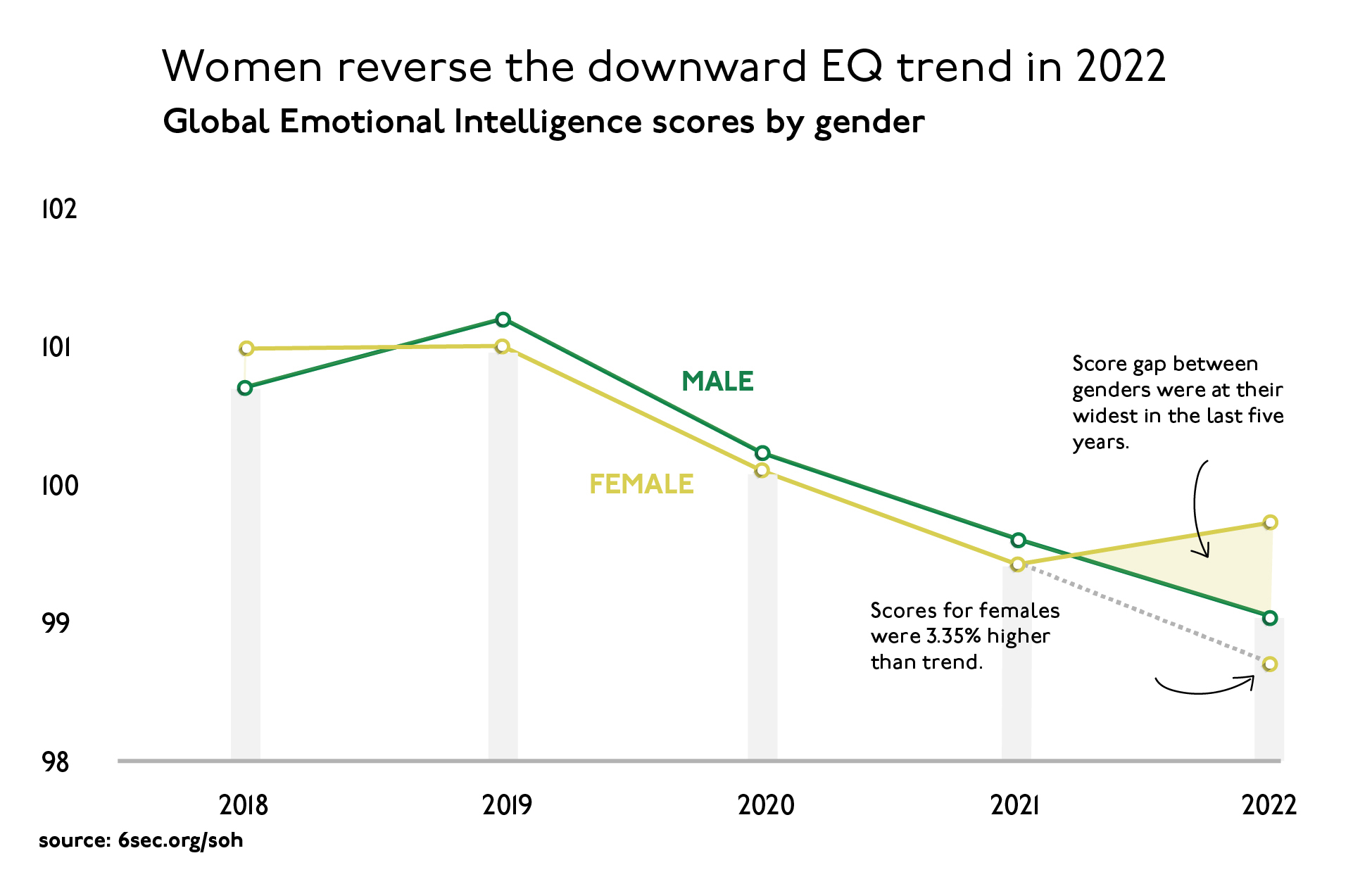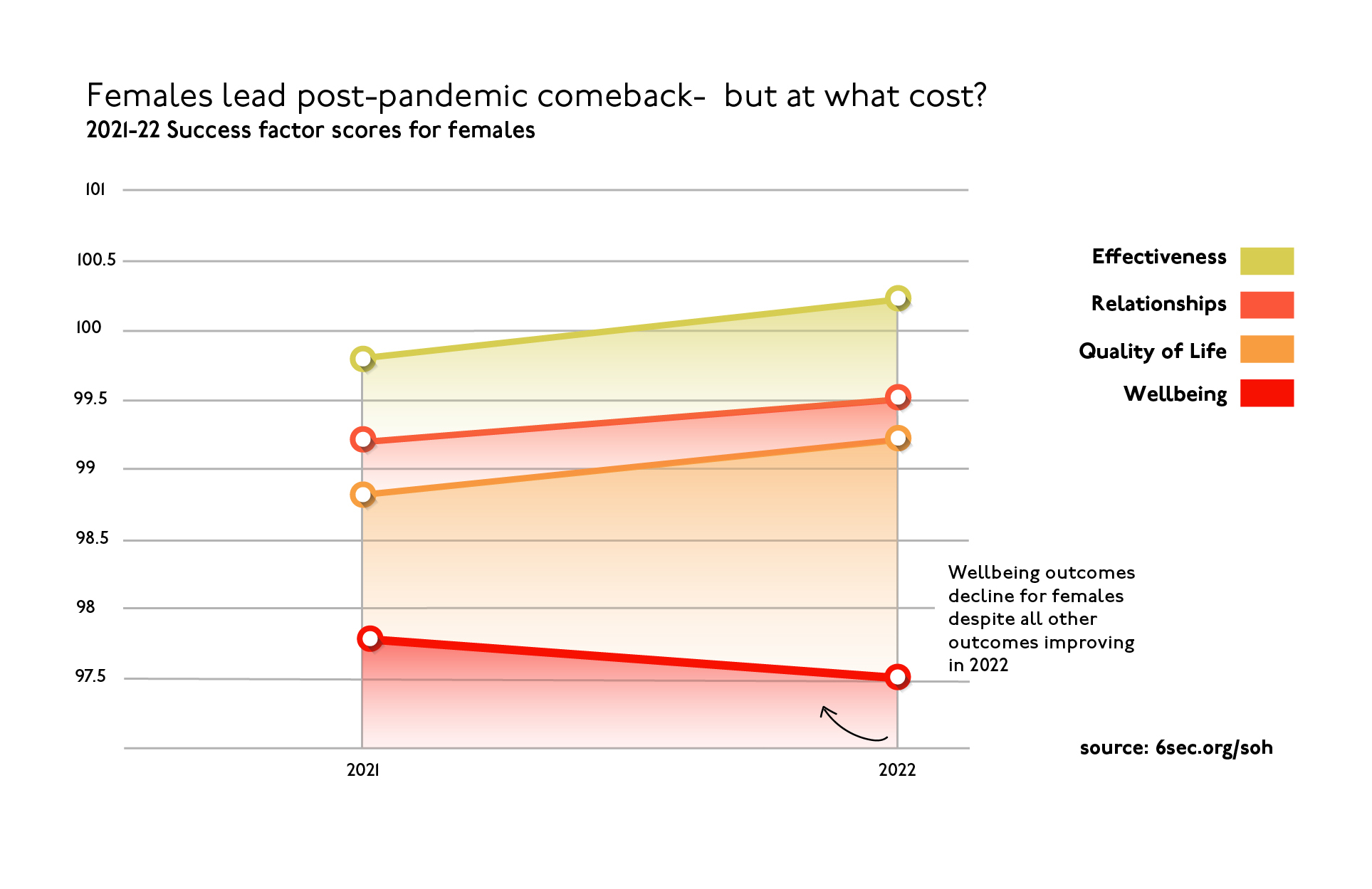Women Lead the COVID Recovery, but at What Cost?
New analysis from the world’s largest study of emotional intelligence.
After a couple tumultuous years for mental and emotional health worldwide, women are leading the post-COVID comeback.
By Michael Miller
New research reveals that women are leading the way out of what Gallup calls the “emotional recession” in the aftermath of the COVID-19 pandemic. Looking at both emotional intelligence scores and correlated life success outcomes like relationships and quality of life, women rebounded in a significant way starting in 2021 – with one notable exception, which we’ll discuss below.
First, let’s look at emotional intelligence, which is a strong predictor of personal and professional success – including job satisfaction, relationship quality and more. Average emotional intelligence scores for both men and women declined from 2019-2021, driven by the mental health challenges of the pandemic. Then, while men’s scores continued to decline, women’s scores rebounded:
“While men’s emotional intelligence scores continued to decline, women’s scores rebounded starting in 2021.”
Six Seconds, State of the Heart 2023
Learn more: 6sec.org/soh

What fueled that change? Increases in self-awareness, empathy, intrinsic motivation and connection to purpose. To see data and graphs for these specific emotional intelligence competencies, register to receive the full report below – and we’ll send you the report as soon as it’s published.
Women lead the comeback – but at what cost?
Women’s scores also increased on a number of key indicators of how life is going.
In addition to measuring overall emotional intelligence and specific emotional intelligence skills, the Six Seconds Emotional Intelligence assessment (SEI) includes a measure of “success factors,” comprising Relationships, Effectiveness, Quality of Life, and Wellbeing. Average scores for women’s Relationships, Effectiveness and Quality of Life all increased from 2021 to 2022 – encouraging data that adds to a growing body of evidence that women are leading the post-COVID comeback. Here are a couple other data points for context:
– After crashing during the pandemic, women’s workforce participation reached a 30-year high in 2023. More women are now in the workforce than ever before.
– Even though women still carry a heavier burden of childcare responsibilities than men do, that gap has shrunk considerably since 2018.
Taken together, these data points paint a picture of a positive trend for women: better relationships, more equal responsibilities, more jobs and greater effectiveness in the jobs. There is, however, one major caveat: Wellbeing is the only Outcome that decreased for women globally from 2021 to 2022. This suggests that while women are leading the comeback post-COVID, they are still carrying an unsustainable mental and emotional burden.
“Average scores for women’s Relationships, Effectiveness and Quality of Life all increased from 2021 to 2022 – encouraging data that adds to a growing body of evidence that women are leading the post-COVID comeback.”
Six Seconds, State of the Heart 2023
Learn more: 6sec.org/soh

In addition to still spending more time on childcare than men do, McKinsey’s 2021 Women in the Workplace report found that an unsustainable burden of emotional labor falls on women at work, too. Compared to men in similar positions, women managers do significantly more to support employees and employee wellbeing. They check in more regularly, help manage workloads, and provide emotional and logistical support. Overall, employees reported women supporting their careers at twice the rate of men.
The end result is that women’s wellbeing suffers, contributing to a burnout epidemic in which women leaders experience burnout at much higher rates than their male counterparts. During the COVID-19 pandemic, this “burnout gap” between men and women doubled. In our research, women’s Wellbeing scores declined 6.98% from 2021 to 2022. For more detailed data on wellbeing and burnout around the world, register to receive the full report below.
About the research
The State of the Heart report is the world’s largest study of emotional intelligence. Drawing on a large global dataset from over 129 countries, State of the Heart uses a randomized sample balanced by geography, gender, and age. The data comes from the Six Seconds Emotional Intelligence assessment, or SEI.
Want a copy of this year’s report? Just fill out the form below and we will drop it in your inbox as soon as it’s published.
- Emotional Intelligence at Work:In the Era of AI, What Happens to Human Skills? - November 19, 2024
- Fortifying the Mental Health of the Entire School Community with Emotional Intelligence - October 30, 2024
- Emotional Intelligence at Work: Exploring the Principles of Exceptional Leaders - October 15, 2024
